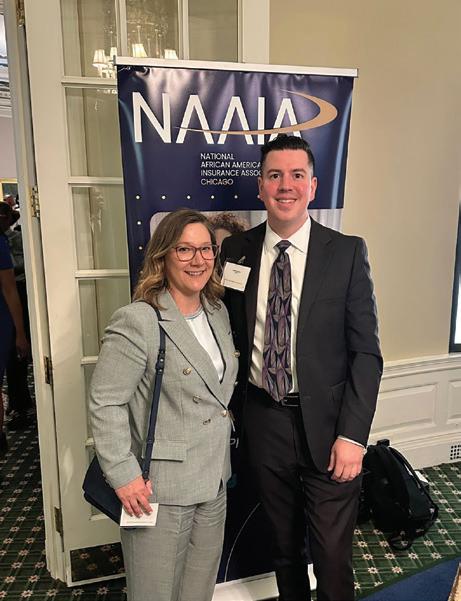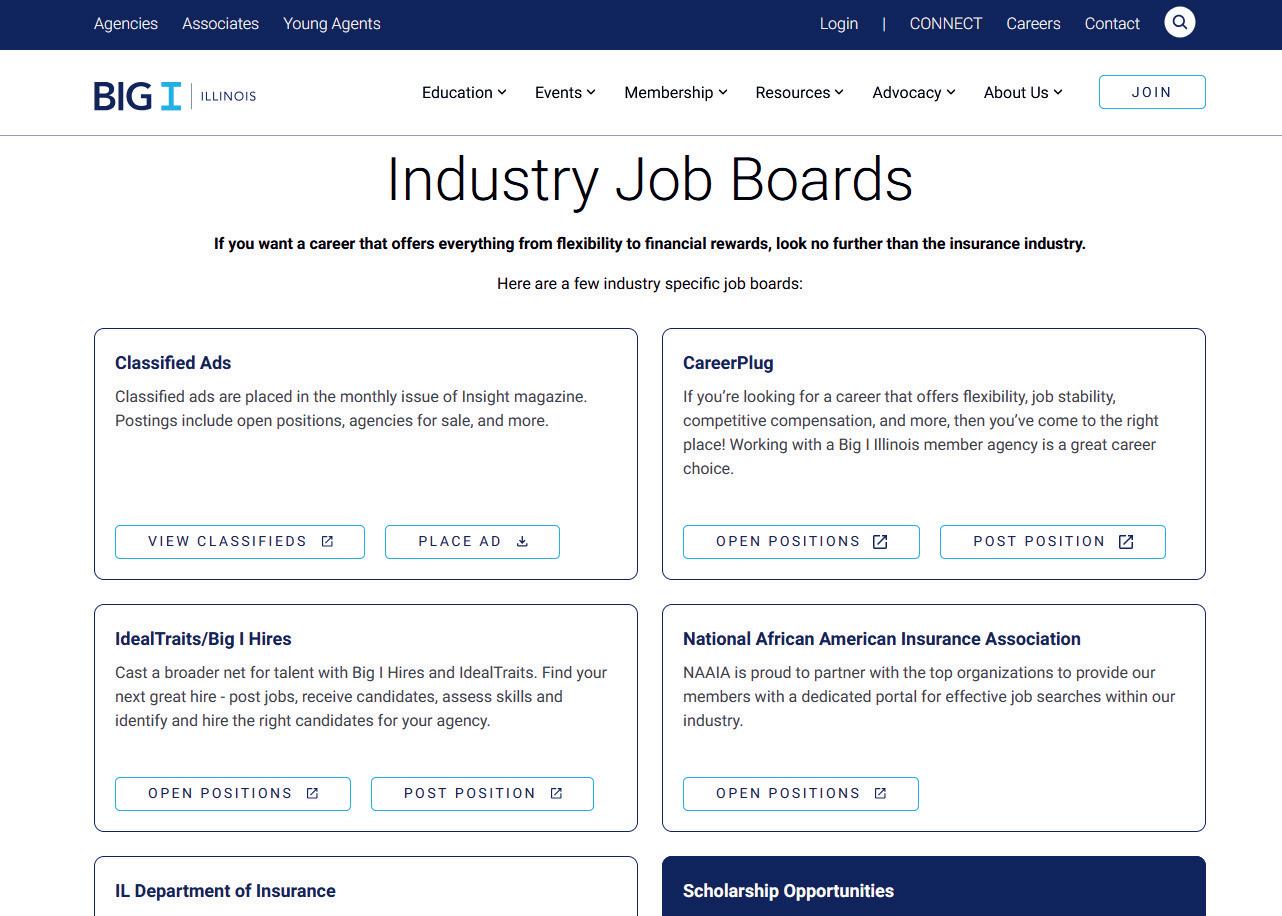












































































































Let us hammer out the sort of custom-made coverages that will keep your contractor customers happy. We cover everything from their tools to errors and omissions to workers’ compensation and more. Trust in Tomorrow.® Talk to us today.
grinnellmutual.com



Brooke Liu


Executive Committee
Chairman of the Board - Allyson Padilla allyson@blanksinsurance.com
President - Patrick Taphorn, CIC, CSRM ptaphorn@unland.com
President-Elect - Thomas Evans, Jr. tom.evans@assuredpartners.com
Vice President - Chris Leming cleming@troxellins.com
Secretary/Treasurer - Cindy Jackman, CIC, CISR cjackman@arlingtonroe.com
IIABA National Director - George Daly george.daly@thehortongroup.com
Mohammed Ali - mali@aliminsurance.com
Charles Hruska, IV - chas@hruskains.com
David Jenk, Esq. - djenk@nwibrokers.com
Rebecca Kohn - rkohn@worthyinsurance.com
Lindsey Polzin - lpolzin@presidiogrp.com
Ray Roentz - ray.roentz@hwcrins.com
Noele Tatlock - ntatlock@unland.com
Luis Tayahua - lt@goldenowlinsurance.com
Sharon Waldvogel - sharon@infinitybrokersinc.com
Andrea Wallace - andreaw@powersinsurance.com
Amiri Curry - acurry@assuranceagency.com
Kevin Lesch - klesch09@gmail.com
Jeff McMillan - jeff@mcmillanins.com
James Sager - james@sagerins.com
Luke Sandrock, CIC - lsandrock@2cornerstone.com
Budget & Finance | Cindy Jackman, CIC, CISR cjackman@arlingtonroe.com
Education | Lisa Lukens salibainsurance@gmail.com
Farm Agents Council | Steve Foster s.foster@ciagonline.com
Government Relations | Dustin Peterson dustin@peterson.insurance
Planning & Coordination | Nick Gunn, CIC ngunn@envisionins.com
Technology | Brian Ogden brian@ogdeninsurance.com
Young Agents | Cody Imming cody@imminginsurance.com
Follow us on socials.
Member Support
Director of Information and Technology
Director of Education and Agency Resources
Accounting & Admin Services
Director of Human Resources, Board Admin
Sr. Vice President/Chief Financial Officer
Chief
Office
Rebecca Buchanan (217) 321-3010 - rbuchanan@ilbigi.org
Shannon Churchill (217) 321-3004 - schurchill@ilbigi.org
Brett Gerger, CIC (217) 321-3006 - bgerger@ilbigi.org
Tami Hubbell, CIC (217) 321-3016 - thubbell@ilbigi.org
Jennifer Jacobs, SHRM-CP (217) 321-3013 - jjacobs@ilbigi.org
Mark Kuchar (217) 321-3015 - mkuchar@ilbigi.org
Phil Lackman, IOM (217) 321-3005 - plackman@ilbigi.org
Lori Mahorney, CISR Elite (217) 415-7550 - lmahorney@ilbigi.org
Evan Manning (217) 321-3002 - emanning@ilbigi.org
Kristi Osmond, CISR Elite (217) 321-3007 - kosmond@ilbigi.org
Rachel Romines (217) 321-3024 - rromines@ilbigi.org
Tom Ross, CRIS, CPIA (217) 321-3003 - tross@ilbigi.org
Carol Wilson, CPIA (217) 321-3011 - cwilson@ilbigi.org
I just got back from Washington, DC, for the National Big I Legislative Conference and have dived right back into legislative issues. Illinois never seems to disappoint. This session, we have everything from rate regulation on personal lines of home and auto to the Secretary of State administering a study on underwriting factors due to the Department of Insurance not having the staff to do the study. You can’t make this stuff up. I wonder how many actuaries the Illinois Secretary of State employs.
The meetings I have been part of have exposed the lack of knowledge that our legislators and regulator have on the technical issues pertaining to insurance coverages. This is where Evan and team come in to educate them on the nuances of the products they are trying to regulate for the protection of the consumer. I try not to get political but rather employ common sense, which goes along with our theme of working smarter, not harder. Common sense is the foundation of that.
When proposing laws, you should truly identify the problem you are trying to solve and establish the fact that it won’t create new problems (unintended consequences). For instance, for rate regulation, the Department of Insurance indicated that they need to proactively stop cost shifting by carriers. Illinois consumers paying for California wild fire losses. This would be in violation of actuarial standards. There has not been one case of this that I know of to date. The unintended consequence is that rates will go up. The other issue on this front is that Illinois already has a very competitively priced market nationally.
This is a great segway to everyday issues you may face regularly. Start with common sense, then identify the problem you are trying to solve. Ask yourself the following questions:
•Does my solution have negative unintended consequences?
•Have I identified the problem correctly?
•What tools do I need?
•What resources do I need?
•Can I live with things the way they are?
Here’s an example: Ozempic was developed for the treatment of type 2 diabetes, and an unintended consequence is that you lose weight. So, not all unintended consequences are bad, but this one may be bad as some people are experiencing negative consequences with Ozempic.

Try to streamline your operations as much as possible by utilizing technology and common sense. Use AI where appropriate; utilize social media schedulers; use VAs where appropriate; and utilize your agency management systems to their full potential. All of these things will allow you to get out and do what you do best: sell.
As always, this is just Brett’s 3 Sense (it dropped to 3 as eggs are down 60% but not all the way to 2 yet due to the tariff uncertainty) and I hope it was helpful. You can contact me through my CONNECT and if it is urgent, do not hesitate to reach me through CONNECT. I may be pushing you to CONNECT. If you need any clarification or have any suggestions for future articles please email me at bgerger@ilbigi.org.


By Evan Manning
Political activism is part of daily life for many of our independent insurance agents. However, for one week out of the year several members of Big I Illinois take time out of their busy schedules to come to Washington D.C. to advocate for their industry at a national level. The annual Big I Legislative Conference took place from April 30-May 2 at the Westin Washington D.C. Downtown Hotel. The spring event brings together over 1,000 independent agents from across the country to talk with lawmakers about issues important to them and their clients.
Most importantly, Big I Illinois brought a total of thirtyfive members, spouses, and staff to Washington D.C. to advocate on behalf on the insurance industry. Over two days, our delegation met with thirteen members of Congress and their staff to discuss a number of issues affecting the insurance industry and our members. We had highly productive meetings and were able to speak directly with our congressperson in most of our meetings. This event is truly one of the premiere events Big I Illinois has to offer our members.
The 2025 Big I Federal Legislative Conference focused on federal policy issues impacting our members. Our members discussed several issues including: making permanent the 20% small business tax deduction, supporting pre-disaster mitigation efforts, addressing legal system abuse, and protecting the Federal Crop Insurance Program (FCIP). If you would like to review the talking points in more detail, go to https://go.ilbigi.org/FLC-2025.

In 2024, Illinois finished second among all states in InsurPAC donations. InsurPAC is the Big I political action committee (PAC), which raised a total of $1.29 million during the 2024 calendar year. Illinois raised $66,540 with our Young Agents raising $13,640 to finish third in the country. Having a strong InsurPac is essential to keep the Big I the most respected and influential insurance advocacy group on Capitol Hill. U.S. Senators and Representatives are keenly aware of which groups have the largest PACs because they regularly see those lobbyists and association members at fundraising events. Not only does that constant presence reflect a strong PAC, but it also signals a vibrant and active membership that is paying attention and engaged in the political process.
If you have not already done so this year, I implore you to contribute to InsurPAC and help push Big I Illinois to the top of the leaderboard for 2025. Contributions must be a personal contribution and can be made directly at independentagent. com/GovernmentAffairs/InsurPac. If you would like to join us next year for the Federal Legislative Conference, please contact me directly.
Evan Manning is the Director of Government Relations for Big I Illinois and can be reached at emanning@ilbigi.org.

Agents, brokers, carrier executives, and Big I staff protect their business by contributing to InsurPac.

Those relationships help open doors to advocate for or against legislation that directly impacts the IA system.

InsurPac distributes that $$ to campaigns for U.S. Representatives, Senators and candidates seeking federal office who support the IA system.
InsurPac allows our Big I federal lobbyists and agents to attend fundraising events. Where they develop relationships with members of Congress and their staff.

Last year, the Corporate Transparency Act (CTA) was enacted, requiring 32.6 million businesses to report their bene cial ownership information to FinCEN. The estimated burden is up to 650 minutes and $2,614 per entity annually, with non-compliance penalties reaching $10,000 and two years in prison. Thanks to Big I advocacy, insurance producers are exempt from this requirement.
When Tax Reform passed in 2017, the Big I ensured that independent agents quali ed for the full 20% small business deduction under section 199A. This deduction is set to expire at the end of 2025. The Big I is supporting the Main Street Tax Certainty Act, which would make the deduction permanent.
The Big I has also successfully advocated for repeated extensions of the National Flood Insurance Program (NFIP) in recent years.






By Carey Wallace and Aaron Stocks
Outsourcing has become a common strategy for businesses looking to stay competitive, reduce costs, and focus on their core functions. For insurance agencies, the question of outsourcing can spark debate, with compelling arguments for it and traditional concerns making agency decision makers wary of it.
Let’s discuss the landscape of outsourcing in our industry as well as the “pros” and “cons” that come with it.
What Does Outsourcing in the Insurance Industry Look Like?
Outsourcing in the insurance industry typically involves delegating various operational tasks to external service providers. These tasks may include accounting, commission reconciliations, financial operations, human resources, legal assistance, or IT-related services.
The goal is simple but impactful – to improve efficiency, enhance expertise, and reduce operational strain while freeing up internal resources.
But while outsourcing has undeniable benefits, it also comes with risks that agencies must address to avoid operational setbacks. Here, we examine both the pros and cons of outsourcing insurance operations, complete with insights that can help you make the best decision for your agency.

1. Access to Specialized Knowledge & Expertise
Outsourcing providers often have deep expertise in the specific areas they handle. They bring in best practices, access to the latest technology, and industry know-how that many insurance agencies may lack in-house and added context by having experience in working with many different agencies. For example, outsourcing financial operations may help your agency with commission reconciliation, trust accounting, and more.
Having industry experts handle these functions ensures processes are handled efficiently while also providing owners and principals with time for other agency activities.
2. Cost-Savings and Impacts
One of the most attractive reasons to outsource is the potential to save money. Staff wages, employee benefits, training costs, and expensive in-house technology can create significant overhead for insurance agencies. Outsourcing can reduce these costs by relying on external vendors that offer the same (or better) results without requiring long-term investment in personnel or tech upgrades.
As seen in the graph, agencies who outsource, see a significant decrease in their overall employee payroll the more that they outsource. For smaller agencies, this can be a game-changer in managing budgets while scaling operations effectively.

Outsourcing an operational function provides your agency with the resources to meet fluctuating demand more easily. During periods of high workload (e.g., open enrollment periods or tax season), external teams can quickly scale up to manage the influx without requiring additional hires.
When positioned to grow, agencies gain a competitive advantage by balancing the workload between internal employees and outsourced professionals. As shown below, agencies poised for growth tend to have higher outsourced spending. However, when agencies are growing rapidly, there is often a decline in both outsourced service spend and overall employee payroll. This may be due to several factors; automation or bots may be supporting the growth, core teams may be absorbing more of the workload, or growth may simply be outpacing the agency’s ability to scale operations quickly enough.
This flexibility ensures consistent service quality, even amid fluctuating demands in customer needs or seasonal activities.

By offloading non-core tasks like legal support, your internal team can dedicate more time to strategic initiatives, customer relationships, and growing the business. Outsourcing allows you to focus on what your agency does best while external vendors handle time-consuming functions behind the scenes.

With outsourcing comes a degree of loss in control. Processes that were previously supervised directly now rely on third-party vendors who may take a slightly different approach. While the right provider will prioritize alignment with your company’s goals and values, it can be challenging to ensure that their execution aligns perfectly with your vision. For example, if financial operations are outsourced to a provider unfamiliar with the nuances of your industry, you risk misunderstandings and potential loss of best practice approaches. You may also have to spend additional time explaining the industry, approaches, and terminology to them.
The success of outsourcing relies heavily on choosing a trusted provider. Not all outsourcing companies have the required expertise or understanding of the insurance industry. This lack of industry knowledge can lead to errors in approach, unnecessary delays, or compliance violations. Unfortunately, examples of unsuccessful outsourcing ventures often involve insurance agencies working with providers that lacked appropriate experience. Such partnerships can not only erode efficiency but even damage client trust.
Insurance agencies work with highly sensitive customer data. When outsourcing functions that include client data, a systematic and secure approach is needed. Without proper security protocols, there’s a risk of data breaches that could harm your agency’s reputation.
Carefully vetting external partners for robust cybersecurity measures is essential to mitigating this risk.
While outsourcing can reduce direct labor costs, there are potential hidden expenses such as management fees, communication barriers, and time spent vetting and onboarding vendors. These costs can add up, particularly if the vendor’s performance falls short of expectations, requiring additional intervention. Make sure the vendor(s) you partner with are transparent in their quoting and Scope of Work.
Outsourcing is not a one-size-fits-all solution. Here are a few key questions to consider before deciding whether it aligns with your agency’s needs:
• What tasks are consuming the most time and resources in my agency?
• Can outsourcing improve service quality or merely reduce costs?
• Does the potential outsourcing provider have documented experience in the insurance industry?
• Are my agency’s data protection measures strong enough to support third-party involvement?
When done thoughtfully, outsourcing insurance operations can create opportunities for growth, efficiency, and cost savings. However, to ensure success, it’s crucial to work with vendors who bring deep knowledge and understanding of the insurance industry, as well as align with your agency’s operational goals and standards.
If outsourcing is part of your business growth strategy, don’t rush through the process. Take time to evaluate potential providers, establish clear performance metrics, and communicate your expectations upfront.
Carey Wallace is the founder of AgencyFocus and Aaron Stocks is CEO of Agencypoint/Pfs Global.

GUARD is laser-focused on providing exceptional service to our agents and brokers and the policyholders we serve. From product refreshes to dedicated underwriting teams to streamlined digital platforms, we’re building smarter solutions that drive success.
By Brian Lawrence
Recognizing staffing capacity continues to be a top issue for members. OIA recently had the opportunity to host a webinar with company partner Cover Desk and two OIA agency members who are successfully using virtual assistants to grow their agency.
The Cover Desk webinar provided a compelling case for integrating virtual assistants into insurance agencies. With the ability to handle administrative tasks, improve efficiency, and reduce costs, VAs offer a practical solution for agencies looking to stay ahead in a competitive market.
The webinar was led by Kelsey Tenaillon, Sr. Director of Business Development for Cover Desk, and featured Bethany Thompson, Co-owner of Mission Insurance, and Sam Isner, President of Isner Insurance. The full webinar can be found on OIA’s Vimeo account at https://vimeo.com/1014932381.
1. The Role of Virtual Assistants in Insurance Agencies
Virtual assistants act as an extension of your agency, providing support with administrative tasks such as answering phones, processing endorsements, and managing online presence. They can help free up owners, producers, and other licensed staff members to focus on revenue-generating and other more important activities.
Kelsey Tenaillon, Senior Director of Development at Cover Desk, explained, “VAs are designed to fit seamlessly into your team, working within your systems and collaborating with your staff.” They are trained to operate in agency management systems like AMS360, Hawksoft, and Applied Epic, ensuring data security and efficient collaboration.
2. Benefits of Hiring a Virtual Assistant Agencies that have adopted VAs have seen a significant improvement in efficiency and staff morale. Sam Isner of Isner Insurance shared his experience:
“The VA saved us when we lost a key employee. She stepped in, learned quickly, and kept us afloat.”





























































































































































































Editors Note: As independent agencies look to streamline operations and boost productivity, virtual assistants (VAs) are emerging as a practical, efficient solution. While this article from our colleagues at Ohio Insurance Agents (OIA) explores how VAs are transforming agencies, we see similar trends and opportunities among Illinois agencies. Here’s what you need to know - and how you might explore the power of virtual assistants in your own operation.
Bethany Thompson from Mission Insurance echoed similar sentiments, highlighting how VAs have helped them manage their online leads while their in-office staff handled walkin clients. “Cover Desk helped us especially during Covid because I didn’t have to hire, train, and bring a new employee into the office.”
The flexibility of virtual assistants allows agencies to scale quickly. Whether it’s handling client calls, chasing late payments, or managing social media, VAs take on a variety of tasks that free up licensed agents for more critical responsibilities.
3. When Should You Consider Hiring a Virtual Assistant?
For agencies struggling to meet deadlines, overwhelmed by administrative work, or dealing with staff shortages, hiring a VA can be a game-changer. Cost is also a factor, as VAs often provide a more affordable alternative to hiring additional inoffice staff. Kelsey Tenaillon pointed out agencies can save on payroll taxes, benefits, and recruitment costs by outsourcing to a VA.
VAs can be a strategic solution for agencies dealing with the complexities of a hard market. As agencies are experiencing more phone calls and more touches on each policy, VAs can help absorb more administrative work while your staff focused on client relationships and retention.
4. Training and Integration
The process of integrating a VA into an agency requires careful planning. While virtual assistants come trained in many technical areas, each agency’s processes are unique. Therefore, it’s essential to train the VA on specific agency procedures. As Tenaillon emphasized, “You will need to invest time initially to ensure they align with how your agency operates.”
Both Isner and Thompson stressed the importance of treating VAs as valued team members. Including them in team meetings and providing regular feedback helps build a cohesive and efficient working relationship.
One of the main reservations agencies have about hiring VAs is the security of client information. Cover Desk addresses this concern by implementing strict security protocols, including dual-factor authentication, controlled domain access, and continuous monitoring. Additionally, VAs work within the agency’s systems, ensuring that data remains secure and compliant with industry standards.
While not covered in this webinar, it is important to understand carriers are placing increased scrutiny on overseas VAs and access to their policy systems. Recently, Cincinnati Insurance contacted agencies requiring them to remove third party overseas access from a long list of foreign countries due to data security concerns. Cover Desk and their employee base in the Philippines was not impacted by this initial notice. However, there are indications other carriers could be following suit and eventually could remove all third-party access to their systems. We advise agencies to consult with their carrier partners to understand their position.
As the insurance landscape continues to evolve, virtual assistants provide agencies with a staffing solution and potential competitive advantage. Cover Desk’s virtual assistant service has proven to be a cost-effective and flexible solution for numerous Ohio agencies looking to optimize their operations without compromising on quality or service.
For agencies considering this route, Tenaillon advises starting early: “Don’t wait until your team is overwhelmed. Hire before you reach a crisis point, so you can focus on growing your agency rather than putting out fires.”
This article was originally published by Ohio Insurance Agents Association. It has been lightly edited and reprinted with permission.
Brian Lawrence is Sr. Director, Talent & Professional Development for Ohio Insurance Agents and can be reached at brian@ohioinsuranceagents.com.

Rather than attempt to be all things to every kind of business, we focus on the ones we know best—restaurants and bars, grocery and convenience stores, medical clinics and auto service shops—to deliver outstanding property, casualty and workers compensation insurance. Deep niche expertise, with insight into unique business risks, is how we cover the details that make the biggest difference to our policyholders.
To discuss an agency appointment, give us a call at 888.5.SOCIETY or visit societyinsurance.com

By Brooke Liu

While there’s no silver bullet solution for maximizing employee efficiencies, there are some improvements a firm can make to their business, gathered through peer insights, that can help drive efficiencies in both operations and service.

A topic that is steadily rising among insurance firm executives is strategies for getting more efficiency from staff. The overall consensus by brokers is that their business needs to determine if there are any competitive enhancements they can use, such as potentially leveraging technology, AI and peer insights, to drive improvements in both service and operations.
Because of this, many insurance brokerage firms are starting to work smarter, not harder. This is evident in efficiency metrics such as revenue per employee. In fact, as indicated in the chart below, revenue per employee continues to increase every year since 2015 (as a percentage year-over-year). While rate lift from the recent hard market may positively contribute toward this incline, MarshBerry consultants are also having more conversations with clients around other initiatives that resulted in increased staff efficiency and productivity.
Using technology and/or AI solutions can increase accuracy and reduce errors and omissions. Specific ways firms are using tech include:
• AI solutions designed to automate and process insurance documents.
• Digital services that handle manual tasks and cover backoffice support.
• AI agents (not to be confused with insurance agents) that can integrate with email systems, optimize team schedules, or take meeting minutes.
• Programs that help create org charts to plan for future staffing needs.
Other commonly used tech solutions include tools to help with cybersecurity and fraud management, inventory support, and customer service.

How are they doing it? Here are three potential insights for improving employee efficiencies gleaned from MarshBerry Connect’s peer exchange:
More and more firms are reporting that they are outsourcing certain functions to increase employee efficiencies and drive better results. According to MarshBerry’s proprietary financial management system Perspectives for High Performance (PHP) the top performing 25% of firms (or “Best 25%” of firms based on organic growth rates) are outsourcing 2.2% of their employees, compared to the average firm who only outsources 0.7% of their staff.

Brokers are outsourcing functions like payroll and basic accounting. Others use virtual assistants to set up systems for sending out motor vehicle records or certificates of insurance. Remember that clients rarely interact with these functions, so using a virtual assistant at a fraction of the price can increase accuracy and efficiency without sacrificing client expectations.
Training and development can also get a boost from tech. Brokerage firms are finding that AI can capture knowledge from senior producers or other experienced personnel before they retire or leave the company. There are programs that can capture information, then create tutorials, instructions, or standard operating procedures for new hires. Even things like client insights or sales best practices can be documented for greener producers or underperformers. This approach can also save time for those busy professionals who may have previously been tasked with training new hires. Firms can have a small amount of on-site instruction blended with independent learning opportunities. Most importantly it creates a repository of priceless knowledge that can be referenced for years to come.
Solutions like these can help create efficiencies across many functions, freeing up staff to do more meaningful client relationship business. But testing and learning can be timely and costly. Instead, lean on a network who’s already done the troubleshooting and knows what works and what doesn’t. That’s one of the biggest benefits of a peer exchange network – it’s like your own personal research group.
Brooke Liu is Senior Vice President at MarshBerry and can be reached at (616) 828-.0741.
Graphs Source: MarshBerry proprietary financial management system Perspectives for High Performance (PHP). Data as of 9/30/24.
Using technology and/or AI solutions can increase accuracy and reduce errors and omissions.
Two of the most common issues shared by independent agency owners are workflow improvements and talent concerns. Questions on these topics are plentiful:
• How can we improve efficiency?
• Where can we find new talent for our teams?
• How will we train and develop our future staff?
• Who will fill in the spots of retiring service team?
However, there are solutions on the rise, but these solutions are not “traditional” by any means. Are they solutions that might be right for your agency? We talked with some of the industry thought leaders on these topics to learn more.
Wessly J. Anderson/AgencyVA: AI + VA = the future of insurance service work. Virtual Assistants are a much younger generation of new insurance talent. Because this new talent was raised on technology, implementation of AI is very natural.
The number one task that is completed by VAs leveraging AI is quoting. I am seeing speed and efficiency improve daily. Since personal lines is more linear, it has shown quick development. Commercial lines is coming along as VAs utilize the best technology and training.

Francisco Lopes/Sonant AI: Agencies’ staff wastes valuable time handling non-revenue generating calls, and those calls distract producers. By automatically triaging and managing basic service calls, AI frees your producers to focus on growth while ensuring consistent, professional client care 24/7.
Carl Ziade’/Gaya: A service team spends a lot of time on tasks like remarketing, policy editing, and updating internal systems. These are critical but highly repetitive tasks that require diligence. VAs are well-suited for this type of work, ensuring it gets done accurately without overwhelming your team. AI, on the other hand, is designed to increase your staff’s productivity - helping them extract and enter data faster and eliminate tedious back-and-forth. For example, tools like Gaya allow agents to reduce their quoting time by 70% as they can super-copy and super-paste information across carrier portals instead of filling each field one at a time.
Vishal Rohra/Kay AI: Agencies typically spend four hours processing paperwork for every one hour spent on sales. AI or VAs enable your core team to focus on high-leverage work, and take away manual, repetitive, admin work off your plate. Workflows like processing client intake, duplicate data entry into multiple carriers, comparing policies, generating proposals, servicing COIs, managing renewals, and constant AMS and CRM up keep. All of this paperwork and data entry slows down service teams, ultimately impacting sales and customer satisfaction.
AI, today, is able to help agencies as a digital CSR, that works with your existing systems, learns your nuances of your processes, and scales quickly as you grow, without any performance management overhead.
Ziade’/Gaya: VAs and AI aren’t here to replace expertisethey’re here to make sure your team can focus on what they do best. AI ensures accuracy by pulling the right information instantly, reducing the risk of errors. VAs, when trained on structured workflows, can handle processes consistently without needing years of industry experience. Together, they create a more efficient, reliable system that keeps things moving without compromising on quality. In short, when you have a solid process, AI or VAs will oil up your operation. But do worry if you don’t have a tight and well thought-out process. Process eats Technology for Breakfast.
Lopes/Sonant AI: You should be looking for AI and VAs that are tailored to insurance agencies so they have a base level of knowledge, but they should never be discussing coverage. They’re designed to complement your team’s expertise by managing routine requests while leaving complex coverage decisions to your licensed professionals.
Rohra/Kay AI: Depending on the AI solution used, there may be cause for concern about the level of insurance knowledge or accuracy of information. Going out to the free version of ChatGPT or Gemini or any number of generalist large language models is going to cause issues.
You want to partner with AI solutions that are focused and trained specifically with Insurance data that is relevant to your lines of business, your carriers, and your tools. These solutions are more accurate and adapt with the changing insurance landscape. Just because a new producer passed their P&C exam, doesn’t mean they are an expert in selling a particular carrier, line or risk type. It takes training for that expertise to develop. The same is true for AI, but with AI, it happens faster, more efficiently and the knowledge is never forgotten.
Anderson/AgencyVA: VAs only require a basic knowledge of insurance, since the tasks you have them do should not require the knowledge. Things like certificates and quoting should always be handled by a VA. The VA should never disrupt the relationship the agency has with it’s clients. The VA should take tasks off the plate of the insurance team so that the team can put more focus on the relationship.
My Clients are Used to Local, Human Service. Won’t AI or VAs Make Them Apprehensive?
Rohra/Kay AI: Building relationships is key to your business, AI cannot replace that. AI is better positioned to pick up the tedious back-office work, before you roll it out to clientfacing tasks. Instead of having it make outbound calls, leverage AI first to manage policies and create quotes faster. This gives more time back to your producers for nurturing relationships and cater to insureds needs. However, as the market gets more receptive to AI, it’s also inevitable that it’ll augment your client facing work. The investments you make today is positioning yourself to be an agency of the future, a competitive edge for the upcoming changes in the industry.
Ziade’/Gaya: People don’t care whether a person/VA or AI completes a task - they care that it gets done quickly and correctly. AI and VAs don’t replace relationships; they remove bottlenecks. When service teams aren’t bogged down with data entry, they have more time to actually talk to clients, solve problems, and provide real value. The key is using AI to handle the repetitive work so human interactions remain personal and high-touch.
Anderson/AgencyVA: AI technology paired with a VA can mimic the accent of the zip code it is calling on. If you don’t think this is real, it has already been successful in calling you. The other option is to have the VA focus on tasks that don’t require the interaction with clients.
Every time you pay someone $20 per hour to do a $10 per hour task, an angel loses its wings. Leadership must always audit the tasks being completed by their team to ensure that the Chef of the restaurant is not bussing tables.
Lopes/Sonant AI: AI is the force multiplier that will allow your staff to provide the best human services that a human can uniquely do. AI handles incoming calls naturally while delivering better service: zero wait times, faster quote intakes, multilingual support, and full context of policies and past interactions.
As you can see, there is a world of opportunities to supplement your service team process with “nontraditional” options. The real question is, “What fits your agency’s process and culture the best?” Once you’ve answered that, you can identify new solutions and incorporate processes that may significantly improve your team’s workflow and your agency’s efficiency.
Learn more about these companies at agencyva.com, gaya.ai, kay.ai, and sonant.ai.
Market Retrievers is a marketing firm offering strategies and implementation solutions to clients in the insurance and risk management space. Find out more at marketretrievers.com.
Big I Illinois asked some of our Technology Committee members to share input on Virtual Assistants. Find out more on the next page!
Big I Illinois asked some of our Technology Committee members to share input on Virtual Assistants. Find out more about the committee at ilbigi.org/technology.
What motivated you to explore virtual assistants or AI for your agency?
The need to improve efficiency and streamline repetitive tasks was a big motivator. As my businesses grew, I realized that outsourcing routine administrative work could free up time for more strategic activities. – Sharon Waldvogel
With increasing staffing needs – it provides our team the ability for our Account Managers to delegate processing work in order to focus on more high level, client-facing work. – Brian Konen
Each day, a staff member used our Download Report to retrieve documents from carrier websites, upload them to our agency management system, and create a CSR activity. It was tedious, time-consuming work usually handed to the newest employee. Partnering with a VA company was the perfect solution. – Ken Samson
We needed help but didn’t have time for multiple interviews, no-shows, or ghost employees. We found a Missouribased company with VAs already trained in our AMS, basic insurance, and carrier systems. Past hiring issues pushed us toward VAs - no payroll paperwork, and they come equipped with computers and monitors. – Andrea Wallace
What tasks or workflows have you delegated, and what impact has that had on your team?
I’ve delegated tasks like scheduling, data mining, digital filing, drip campaigns, templates, system cleanup, statement downloads, commission reconciliations, and marketing, just to name a few. This has allowed my in-house team to focus on high-priority, client-facing tasks, leading to improved productivity and overall satisfaction. – Sharon Waldvogel
By offloading the document retrieval to the VA, my staff is happier and more efficient. The VA completes the daily project overnight and the activities/documents are waiting for the CSR in the morning. – Ken Samson
What lessons did you learn during onboarding or implementation?
Clear communication is key. We set expectations upfront and maintain an ongoing feedback loop to get the best results from virtual assistants. We teach each workflow once, make a video of it, and then layer additional skills on top. – Sharon Waldvogel
Hiring a virtual assistant takes time and should be approached just like hiring any other employee. There are pros and cons to working with different VA firms, so it’s important to do your research. Set clear, precise expectations from the start to avoid any misunderstandings. – Brian Konen
You must provide step by step instructions on how you want the task done in your agency. Videos are very helpful as well during the training process. You will also want the VA to shadow your team for a few weeks so that they can see how things are done. We wanted VAs in our time zone to ensure full focus during business hours. – Andrea Wallace
How do you maintain your agency’s “personal touch” while using automation or outsourced support?
Have VAs only work on processing work – allows more time for in-house AMs to provide the personal touch we want to provide. – Brian Konen
Right now, our VA handles back-office ‘scut work’—tasks that need doing but aren’t a good use of a seasoned CSR’s time. They don’t interact with clients… yet. I could see them sending email reminders on behalf of a CSR eventually, but I’m still working that out. – Ken Samson
Treat the VA as a team member, include them in all staff meetings. We allowed the VA to communicate with clients via email such as providing general info or ID cards, etc., but the account rep is still their main point of contact with clients. – Andrea Wallace
What advice would you give another agency considering a VA or AI solution?
Start small and gradually integrate virtual assistants into your workflow. Focus on areas that can benefit from efficiency gains but always maintain a human connection in your client relationships. – Sharon Waldvogel
There are new VA companies popping up every day. I would recommend going with a known VA that has a reputation in the insurance industry. It is also critical to know how the VA is going to secure your client data. When I was interviewing VA’s, I talked to more than a few that made me very uncomfortable with where the VA’s worked and the computers and security they were providing on their side. Finally, I would set up security in your agency management system for the VA so they can only see the data you need them to see. – Ken Samson
Just do it! It is some work upfront but once you have them going, it is invaluable to an agency and the labor cost is less than that what you can find here, and they truly enjoy working and they make a good wage. – Andrea Wallace
We explored virtual assistants as a replacement for a retiring full time team member who handled commission reconciliation. Ultimately, we reassigned the task to a part-time employee - gave her better tools. The retiring employee had resisted change, so even minor automation made a big difference. On top of the new tools, the new part-time employee embraced the changes with enthusiasm, seeing them as an opportunity to improve processes. Now we’re more efficient than ever, and Applied’s upcoming AI tools will take it even further. - Agency Member
By Casey Nelson
Let’s take a trip back in time. Picture the world of independent insurance agencies between 2005 and 2022. Outsourcing was the name of the game, and it usually meant finding a virtual employee to handle all those tasks that piled up faster than you could clear your inbox. It was practical, cost-effective, and kept things running smoothly. But just like every industry, the world of outsourcing has evolved. Fast forward to today, and we’re talking about a whole new approach, driven by the power of AI. And trust me, it’s a game-changer.
Outsourcing Back in the Day: The Virtual Assistant Era
Back in the day, outsourcing was all about finding affordable help. You’d hire a virtual assistant (VA) and they’d take on the routine tasks that kept your agency running. We’re talking about data entry, scheduling appointments, handling customer service requests - basically, all the stuff that had to get done but didn’t exactly light up your day.
These VAs were the unsung heroes of many independent insurance agencies. They kept things moving behind the scenes, allowing you to focus on the big picture without breaking the bank. And while this approach worked well for keeping costs down and managing workloads, it wasn’t exactly setting the world on fire in terms of innovation or growth. It was efficient and it was more about getting the job done so you could scale your agency than about making meaningful strides in your business.
Outsourcing Today: Embracing AI for a
Now, let’s fast forward to today. If you’re still thinking of outsourcing only to find inexpensive labor, it’s time to rethink the whole concept. In 2023 and beyond, outsourcing has taken on a whole new meaning, thanks to the rise of AI. And no, AI isn’t here to take over your office - it’s here to be the ultimate teammate.
Today’s outsourcing isn’t about shipping tasks off to a VA. It’s about using AI tools to automate processes that used to eat up your team’s time. We’re talking about everything from data entry and claims processing to customer service interactions and even some of the more complex stuff like underwriting. These AI tools can handle the repetitive, time-consuming tasks with speed and precision, freeing up your staff to focus on what really matters.

But here’s the thing: AI isn’t here to replace your staff. It’s here to help them shine. By outsourcing the mundane tasks to AI, your team can spend more time doing what they do best - building relationships with clients, coming up with creative solutions, and driving your business forward. And isn’t that what we all want? A team that’s not bogged down by paperwork but energized and focused on growing the agency.
AI Coaching: Your Secret Weapon for Professional Growth
And it gets even better. AI isn’t just about taking tasks off your plate - it’s also about helping your team get better at what they do. Imagine having an AI tool that listens to your team’s phone calls and offers feedback like a coach who’s always in your corner. Maybe it picks up on things like filler words or the tone of the conversation, giving your team tips on how to improve. This kind of AI coaching helps your staff develop their skills, leading to better client interactions and a more confident team.
So, instead of thinking of AI as just another tool, think of it as a partner in your agency’s success. It’s like having a personal trainer for your business, helping you and your team get stronger, faster, and better at what you do.
Whether we’re talking about virtual assistants or the AI-driven tools, the goal of outsourcing has always been to make your agency run more efficiently. But while the methods have changed, the mission remains the same: to free up your time and resources so you can focus on what really mattersserving your clients and growing your business.
The difference now is that outsourcing isn’t just about cutting costs. It’s about working smarter, not harder. It’s about giving your team the tools they need to succeed and ensuring that your agency stays competitive in an increasingly tech-driven world.
So, whether you’re reminiscing about the days of virtual assistants or diving into the world of AI, remember this: outsourcing, in its many forms, is a powerful tool that, when used correctly, can help your agency thrive. It’s not about replacing your staff - it’s about giving them the freedom and support they need to excel. And that’s a win-win for everyone.
Casey Nelson is Catalyit’s Director of Consulting. Find out more at Catalyit.com.




Thank you to our Associate Members.

Progressive
Surplus Line Association of Illinois Gold
Arlington/Roe
Blue Cross/Blue Shield of IL
CRC Group
Pekin Insurance
Silver Level
Bliss-McKnight
IMT Insurance
Keystone Insurance Group, Inc.
MEM
Bronze Level
A. J. Wayne & Associates
AAA, The Auto Club Group
AMERISAFE
AmTrust Insurance
Apollo Brokers dba Limit
Auto-Owners Insurance Co.
Berkley Small Business Solutions
Berkshire Hathaway GUARD Insurance Companies
BluSky Restoration Contractors, LLC
Boundless Rider
BriteCo
Central Illinois Mutual Insurance Company
Chubb
Columbia Insurance Group
Cowbell Cyber
Cray, Kaiser Ltd.
Donald Gaddis Company, Inc.
Donegal Insurance Group
EMC Insurance
Encova Insurance
Erie Insurance Group
Forreston Mutual Insurance Company
Graham-Rogers
Grinnell Mutual Reinsurance Company
IA Valuations
Illinois Mine Subsidence Ins Fund
Illinois Public Risk Fund
Imperial PFS
Independent Mutual Fire Insurance Company
Indiana Farmers Insurance
Insurance Program Managers Group (IPMG)
J M Wilson
Liberty Mutual/Safeco Insurance
Madison Mutual Insurance Company
Main Street America Insurance
Mercury Insurance Group
Midwest Insurance Company
Nationwide
Paychex HR and Payroll Solutions
Rockford Mutual Ins. Co.
SECURA Insurance
ServiceMaster DSI
Society Insurance
SPRISKA - Specialty Risk of America
Steadily
Summit Insurance
Travelers
W. A. Schickedanz Agency, Inc./Interstate Risk Placement
West Bend Insurance Company
Western National Insurance
Westfield
XPT Specialty





In this James K. Ruble Graduate Seminar attendees will hear about the following topics:
- Commercial Lines Troubles and Solutions
- Cutting Edge Insurance Issues - Cutting Edge Insurance Issues
- Solving the Mysteries of Business Income Coverage and Claims
- The Insured, Additional Insured vs. Named Insured Debate


For information regarding Big I Illinois membership or company sponsorship, contact Lori Mahorney, Director of Membership Services, at (217) 321-3008, lmahorney@ilbigi.org.























































To




Big I Illinois HR Director Jennifer Jacobs took part in the NAAIA Scholarship Luncheon on April 30th at the Union League Club in Chicago, where seven deserving students were recognized for their accomplishments. These students came out on top in a pool of immensely talented candidates who were considered for the awards. Big I Illinois Matt Cooper presented the prestigious Ron Allen Scholarship to a student studying Risk Management at Illinois State University.
Keynote speaker Kevin Johnson of Aon and Emcee Tamra Johnson of APCIA highlighted the event’s theme “Let Them See You.” Big I Illinois is proud to support this event along with our member agencies. If you would like to find out more about NAAIA or how to participate in future scholarship luncheons, reach out to Jennifer Jacobs, jjacobs@ilbigi.org.
The Northern Illinois Golf Outing was held May 19 in Elgin. Though it was a cold day on the course, it was another fantastic event! Thank you to all that supported the StatePAC Raffle and special thanks to George Daly for donating his winnings! We were able to raise $565 for our State Political Action Committee.
Big shout out to our sponsors!
Beverage Cart: Alliance Disaster Kleenup
Lunch: Accident Fund
Reception: ServiceMaster DSI
Hole Sponsors: Blue Sky Restoration, Donald Gaddis Co., Paychex, Travelers, West Bend
Congratulations to the team from Badger Mutual for taking first place in a scorecard playoff against the team from Agile Premium Finance. Shout out to the players from Arachas Group who came in third! We hope to see you all again in next year’s Northern IL event.




Big I Illinois Board members met to review the preliminary budget for FY 2025-2026 and received an update from the Big I National team regarding Alliance Blue Market Access programs and Alliance Gold – Strategic Carrier Alignment. The programs are growing rapidly and a new employee will be added soon to handle the additional business. For more information about the Big I Alliance programs, visit bigimemberalliance.com. The Big I Illinois Board meets again in August in Springfield.



23. Are you looking for an exit strategy while still continuing to produce for a few years or are you ready to sell now? Paczolt Insurance would like to talk with you! We are an independent agency dating back to the 1970s that is located in the western suburbs. Our focus is on mid-to-small commercial accounts and personal lines. Our companies include EMC, Badger Mutual, Safeco, Progressive, and Travelers. We have the flexibility and capital to get a deal done. Contact:
Susan Troppito
Paczolt Insurance susan@piaigroup.com (708) 215-5202
20. Since 2004, Central Illinois Agents Group LLC has been providing independent agents with a variety of markets with contingency opportunities. Agents have availability to several markets that they may not be able to sustain or maintain on their own. We have markets for personal, commercial, agricultural and crop insurance lines. Let us help you get to the next level.
Visit www.ciagonline.com for contact information.
02. Forest Park/Oak Park agency for over 60 years, will meet your needs by providing space, markets, marketing & sales support, automation, merging with or purchasing your agency. Perpetuation/ Succession Plans, Buy-Sell Agreements also available. We have experienced, educated and dedicated staff for you and your clients. Have access to our numerous companies, office services and many other resources. Please look closely at us- we are an agency you want to do business with! We’ve done it before, we know how- we make it easy! Visit our website at forestagency.com/agents.html, or call for a confidential discussion and a list of Agency benefits.
Dan Browne will provide an agency evaluation/appraisal at little cost to you. Please call:
Dan Browne or Cathy Hall Forest Insurance/Relation Insurance Services (708) 383-9000
www.forestinsured.com/mergers-acquisitions



Envision Healthcare is the only HRA Plan Provider to protect your employee’s healthcare dollars by paying the provider directly. Clients save an average of 40% in annual premium while still allowing employees to have a benefit rich healthcare plan.
n Envision’s proprietary system enables brokers to present unique benefit programs not available through any insurance company
n Envision’s professional, easy enrollment and customer service team delivers seamless processing for your customers.
n Envision’s innovative reporting capability is designed to enable management to make informed decisions concerning their employees’ healthcare costs


Today driving distances on tour are over 320 yards.
In 1985 driving distances averaged 256 yards.
Luke Donald knows the game has evolved. As a winning Ryder Cup Captain, he chooses his players carefully.
At United Risk, we unite elite capability backed by proven results. A magnet for apex underwriting professionals committed to free enterprise and success.